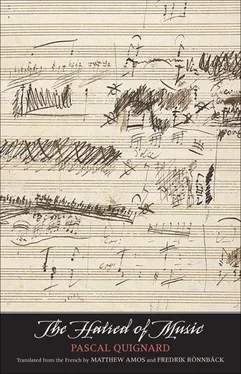Sound gathers us, governs us, organizes us. But we open sound within us. If we focus our attention on identical sounds that are repeated at equal intervals, we do not hear them one by one. We spontaneously organize them into groups of two or four sounds. Sometimes three; rarely five; never more. And it is no longer the sounds that seem to be repeated but the groups that appear to follow one another.
Time itself is thus aggregated and segregated.

Henri Bergson took the example of the mechanical clock. But we always group by two the sounds of the seconds, as if electric clocks had conserved within themselves the ghost of a pendulum’s dance.
People who live in France call this sound group tic-tac . And it sincerely and almost indisputably appears to us as if the time between tic and tac is shorter than between the tac, which seems to terminate the double beat, and the tic, which seems to begin the following group.
Neither the rhythmic grouping nor the temporal segregation is a physical fact.

Why then does the spontaneous grouping seem to correspond to a pulsation of attention? Why such a tyrannical pulse of the soul? Why are humans present to this world in a way that is not instantaneous but that relies on a minimum of simultaneity and succession?
Why does the human present leave the place for language implicit?
Humans immediately hear phrases. To them a string of sounds immediately forms a melody. Humans are the contemporaries of slightly more than the instant. And this is how language takes form in them and enslaves them to music. One cannot help but think that they move toward their prey on something else than the succession of a single foot. And it is by this “more than a single foot” that they run without falling and come to mimic and accentuate and constrain predation in dance.

If asked, man has an incredibly difficult time achieving arrhythmia. It is impossible for him to pull off the most irregular possible succession of claps.
Or at least it is impossible for him to hear it.

In an article published in 1903, R. McDougall proposed to call “dead interval” the very particular silence that, to the human ear, separates two successive rhythmic groups. The silence that separates these groups is a paradoxical duration that starts with the “end” and is interrupted by the “beginning.”
This silence that humanity hears does not exist.
R. McDougall called it “dead.”

There are not two “sides” of music.
This “death” corresponds to the production of music as well as to the perception of music. Simon Laks does not see things differently from Primo Levi. Acoustic perception is not opposed to acoustic emission.
There are no damned, facing malediction.
There is a force that simultaneously turns back on itself and similarly transforms those who produce it by plunging them into the same rhythmic, acoustic, and bodily obedience. Simon Laks died in Paris on December 11, 1983. Primo Levi took his own life on April 11, 1987. Simon Laks wrote very clearly: “There is no lack of publications that declare, not without a certain pomposity, that music kept the emaciated prisoners alive and gave them the strength to resist. Others maintain that the same music had the opposite effect, that it demoralized the wretched and precipitated their end. I for one share the latter opinion.”

In Musiques d’un autre monde , Simon Laks tells the following story.
In 1943, in the camp at Auschwitz, for the Christmas vigil, Major Schwartzhuber ordered the musicians of the Lager to play German and Polish Christmas carols for the sick at the women’s hospital.
Simon Laks and his musicians went to the women’s hospital.
At first, all the women were overcome by tears, in particular the Polish women, to the point where their sobbing drowned out the music.
Later, cries replaced the tears. The sick cried: “Stop! Stop! Get out! Leave! Let us die in peace!”
It happened that Simon Laks was the only musician who understood the meaning of the Polish words that the sick women shrieked. The musicians looked at Simon Laks, who gestured to them. And they withdrew.
Simon Laks said that he had never thought until then that music could do such harm.

Music harms.

Polybius wrote: “One must not believe Ephorus when he says that music was given to man as the trickery of a charlatan.” Ephorus did not speak in such terms. He wrote: “Music was made to charm and bewitch.” What Polybius calls “charlatanry of music” refers to its initiatory, zoomorphic, ritual, cavernous, shamanic, drunk, delirious, omophagic, enthusiastic origin.

Gabriel Fauré said of music that writing it as well as hearing it led to the “desire for inexistent things.”
Music is the reign of the “dead interval.”
It is the irreversible that visits. It is the past that “repasses.” It is nowhere that comes here. It is the return of that which is without return. It is death in daylight. It is the aseme in language.

In Plato, The Republic III , 401 d.
Music penetrates to the interior of the body and takes hold of the soul. The flute induces a dance movement in the limbs of humans, followed by an irresistible salacious squirming. Music’s prey is the human body. Music is invasion and capture of this body. It plunges those it tyrannizes into obedience by snaring them in the trap of its song. The Sirens become the odos of Odysseus (ode in Greek means both path and song). Orpheus, the father of songs, softens stones and tames lions and harnesses them to plows. Music captures, it captivates in the place where it resounds and where humanity tramples toward its rhythm, it hypnotizes and causes man to abandon the expressible. In hearing, man is held captive.

I am surprised that people are surprised that those among them who love the most refined and complex music, who are capable of crying while listening to it, are at the same time capable of ferocity. Art is not the opposite of barbarity. Reason is not the contradiction of violence. One cannot oppose the arbitrary and the State, peace and war, bloodshed and structured thought, because arbitrariness, death, violence, blood, thought are not free from a logic that remains a logic even when it defies reason.
Societies are not free from the chaotic entropy that was their origin: it will be their destiny.
The sideration of hearing leads to death.

The song-birdcall allows for shooting and killing. This function persists in the most sophisticated music.
During the extermination of millions of Jews, the administration of the camps deliberately had recourse to such a function. Wagner, Brahms, Schubert were its Sirens. Vladimir Jankélévitch’s reaction, abstaining from listening to and interpreting German music, was national.
Читать дальше













